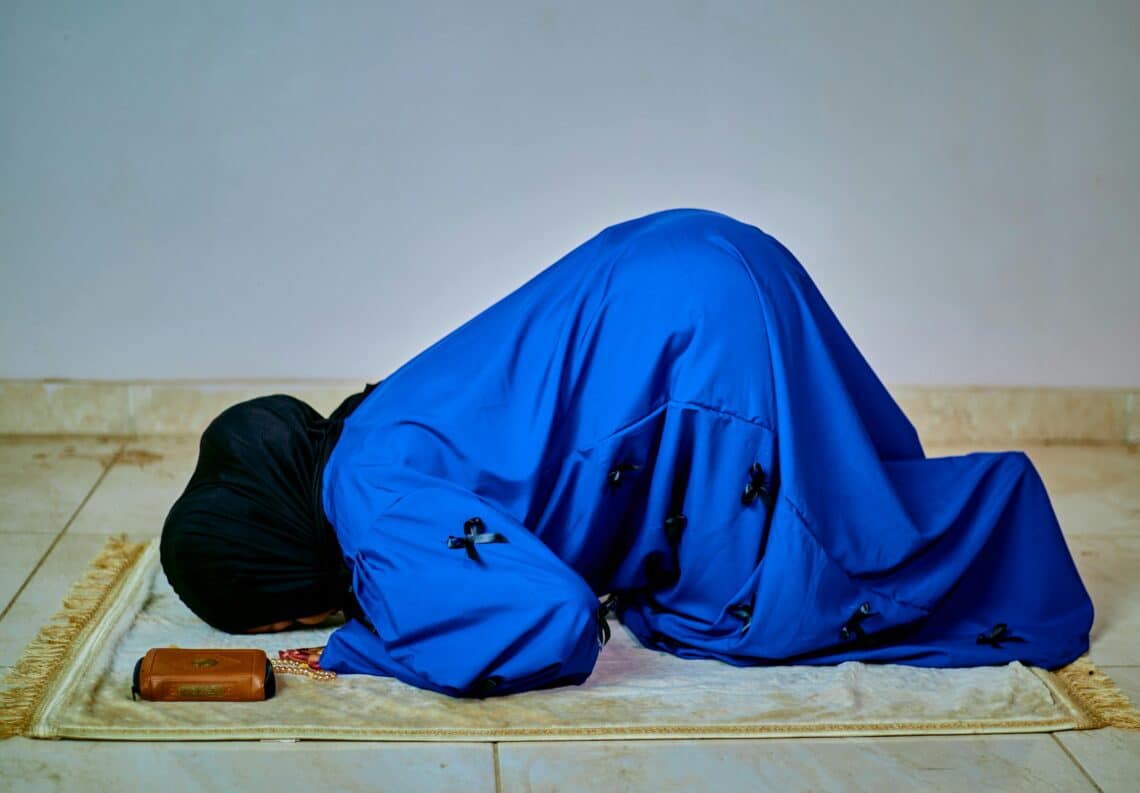1. Introduction – Why Muslims Pray, how to pray in Islam
- Prayer (Salah) is talking to God five times a day
- It is the second most important duty in Islam
- Prayer helps Muslims stay close to Allah
- It brings peace to the heart and mind
- Millions of Muslims worldwide pray together at the same times
2. Getting Ready for Prayer
A. Cleaning Yourself (Wudu)
- Wash your hands three times
- Rinse your mouth three times
- Clean your nose three times
- Wash your face three times
- Wash your arms up to elbows
- Wipe your head with wet hands
- Clean your ears
- Wash your feet up to ankles
- This makes you physically and spiritually clean
B. What You Need
- Clean clothes that cover your body properly
- A clean place to pray (can use a prayer mat)
- Know which direction is Mecca (use a compass or app)
- Make sure it’s the right time for prayer
C. Dress Code
- Men: Cover from navel to knees (minimum), shoulders covered is better
- Women: Cover whole body except face and hands
- Clothes should be loose and modest
3. The Five Daily Prayers – When to Pray
A. Fajr – Morning Prayer
- Time: Before sunrise, when sky starts getting light
- Number of units: 4 Rak’ahs
- This prayer starts your day with God
B. Dhuhr – Afternoon Prayer
- Time: After the sun passes the middle of the sky
- Number of units: 12 Rak’ahs
- A break in the middle of your busy day
C. Asr – Late Afternoon Prayer
- Time: Late afternoon before sunset
- Number of units: 8 Rak’ahs
- Prayer before evening comes
D. Maghrib – Evening Prayer
- Time: Right after sunset
- Number of units: 7 Rak’ahs
- Thanking God as the day ends
E. Isha – Night Prayer
- Time: When the sky becomes completely dark
- Number of units: 17 Rak’ahs
- Last prayer before sleep
4. Step-by-Step: How to Pray

A. Starting the Prayer
- Stand on your prayer mat facing Mecca
- Make intention in your heart (decide which prayer you’re doing)
- Raise both hands to ear level
- Say “Allahu Akbar” (God is the Greatest)
- Place right hand over left hand on your chest
B. First Standing Position
- Recite the opening chapter (Surah Al-Fatiha) quietly or loud
- It takes about 30 seconds to recite
- Then recite any other short chapter from Quran
- Keep your eyes looking down at the place you’ll put your forehead
C. Bowing Down (Ruku)
- Say “Allahu Akbar” and bend forward at your waist
- Keep your back straight like a table
- Place hands on your knees
- Say “Subhana Rabbiyal Adheem” three times (Glory to my Lord, the Great)
- Stay calm and still
D. Standing Up Again
- Rise up saying “Sami Allahu liman hamidah” (God hears those who praise Him)
- Stand straight and say “Rabbana walakal hamd” (Our Lord, all praise is for You)
- Keep hands at sides
E. First Prostration (Sujood)
- Say “Allahu Akbar” and go down on your knees
- Place forehead and nose on the ground
- Keep palms flat on ground near your head
- Say “Subhana Rabbiyal A’la” three times (Glory to my Lord, the Highest)
- This is the closest position to God
F. Sitting Between Prostrations
- Say “Allahu Akbar” and sit up on your knees
- Rest hands on your thighs
- Say “Rabbighfirli” (My Lord, forgive me)
- Sit calmly for a moment
G. Second Prostration
- Say “Allahu Akbar” and go down again
- Same as first prostration
- Say “Subhana Rabbiyal A’la” three times
- This completes one Rak’ah (unit)
H. Continuing the Prayer
- Stand up for second Rak’ah (repeat all steps)
- After two Rak’ahs, sit for Tashahhud
I. Sitting Position (Tashahhud)
- Sit on your left foot, right foot upright
- Point right index finger
- Recite the testimony of faith
- This is done after every two Rak’ahs
J. Ending the Prayer
- After final sitting, turn your head right
- Say “Assalamu alaikum wa rahmatullah” (Peace be upon you and God’s mercy)
- Turn your head left and repeat the same
- You’re greeting the angels and fellow Muslims
- Your prayer is now complete
5. What to Say in Prayer (Simple Translations)
A. Surah Al-Fatiha (Opening Chapter)
- “In the name of God, most Gracious, most Merciful”
- “Praise be to God, Lord of all worlds”
- “Most Gracious, most Merciful”
- “Master of the Day of Judgment”
- “You alone we worship, You alone we ask for help”
- “Guide us on the straight path”
- “Path of those You blessed, not those who earned anger or went astray”
B. Short Supplications
- While bowing: “Glory to my Lord, the Great”
- While prostrating: “Glory to my Lord, the Highest”
- Asking forgiveness: “My Lord, forgive me”
6. Common Mistakes Beginners Make
A. Physical Mistakes
- Praying too fast (rushing through movements)
- Not keeping back straight while bowing
- Not touching forehead properly to ground
- Moving around too much during prayer
- Not standing still between movements
B. Focus Mistakes
- Thinking about other things during prayer
- Looking around the room
- Fidgeting with clothes or prayer mat
- Not concentrating on what you’re saying
C. Timing Mistakes
- Praying too early or too late
- Missing prayers completely
- Not praying on time regularly
7. Helpful Tips for New Muslims or Beginners
A. Learning Stage
- Don’t worry about perfection on day one
- Learn one step at a time
- Watch video tutorials online
- Ask someone to teach you in person
- Practice movements without recitation first
- Then add the words slowly
B. Memory Aids
- Write down the Arabic words with pronunciations
- Listen to audio recordings and repeat
- Practice daily, even 5 minutes helps
- Use prayer learning apps on your phone
- Put reminder notes around your house
C. Building the Habit
- Set phone alarms for prayer times
- Start with one or two prayers if five seems hard
- Pray with family or friends for motivation
- Keep a prayer tracker or journal
- Reward yourself for consistency
D. Dealing with Difficulties
- If you forget words, do your best and continue
- If you make a mistake, don’t restart – just continue
- If you’re sick, you can pray sitting or lying down
- If traveling, you can shorten some prayers
- Ask God for help in staying consistent
8. Benefits of Regular Prayer
A. Spiritual Benefits
- Strengthens your relationship with God
- Washes away small sins
- Brings inner peace and calmness
- Helps you remember God throughout the day
- Protects you from bad actions
B. Mental Benefits
- Reduces stress and anxiety
- Creates routine and discipline in life
- Gives you quiet time to reflect
- Helps clear your mind
- Provides hope and comfort in difficult times
C. Physical Benefits
- Prayer movements are like gentle exercise
- Improves flexibility and posture
- Helps with blood circulation
- Creates mindfulness of your body
- Regular schedule promotes healthy routine
D. Social Benefits
- Connects you with millions of Muslims praying together
- Creates sense of community
- Teaches punctuality and time management
- Shows equality (everyone prays the same way)
- Brings families together for prayer
9. Frequently Asked Questions
A. What if I don’t know Arabic?
- Start learning slowly, word by word
- It’s okay to make mistakes while learning
- Use translations to understand meanings
- Keep practicing, it gets easier
B. What if I miss a prayer?
- Pray it as soon as you remember
- Ask God for forgiveness
- Try not to miss the next one
- Don’t give up, just keep trying
C. Can I pray anywhere?
- Yes, if the place is clean
- Can pray at work, park, school, home
- Just need a clean spot facing Mecca
D. What if I move during prayer by accident?
- Small movements are okay
- Prayer is still valid
- Just try to stay still next time
10. Conclusion – Your Prayer Journey
- Prayer is a gift from God, not a burden
- Every Muslim’s prayer journey is unique
- Start where you are, improve gradually
- God loves consistency, even if small
- Prayer changes your life for the better
- It’s never too late to start praying
- Take it one day, one prayer at a time
- Remember: God is Most Merciful and accepts all sincere efforts
If you’re new to performing Islamic prayers, you can first read my post on How to Pray in Islam. And for guidance through prayer, don’t miss Complete Guide to Dua Istikhara, Prayer for Seeking Allah’s Guidance.





